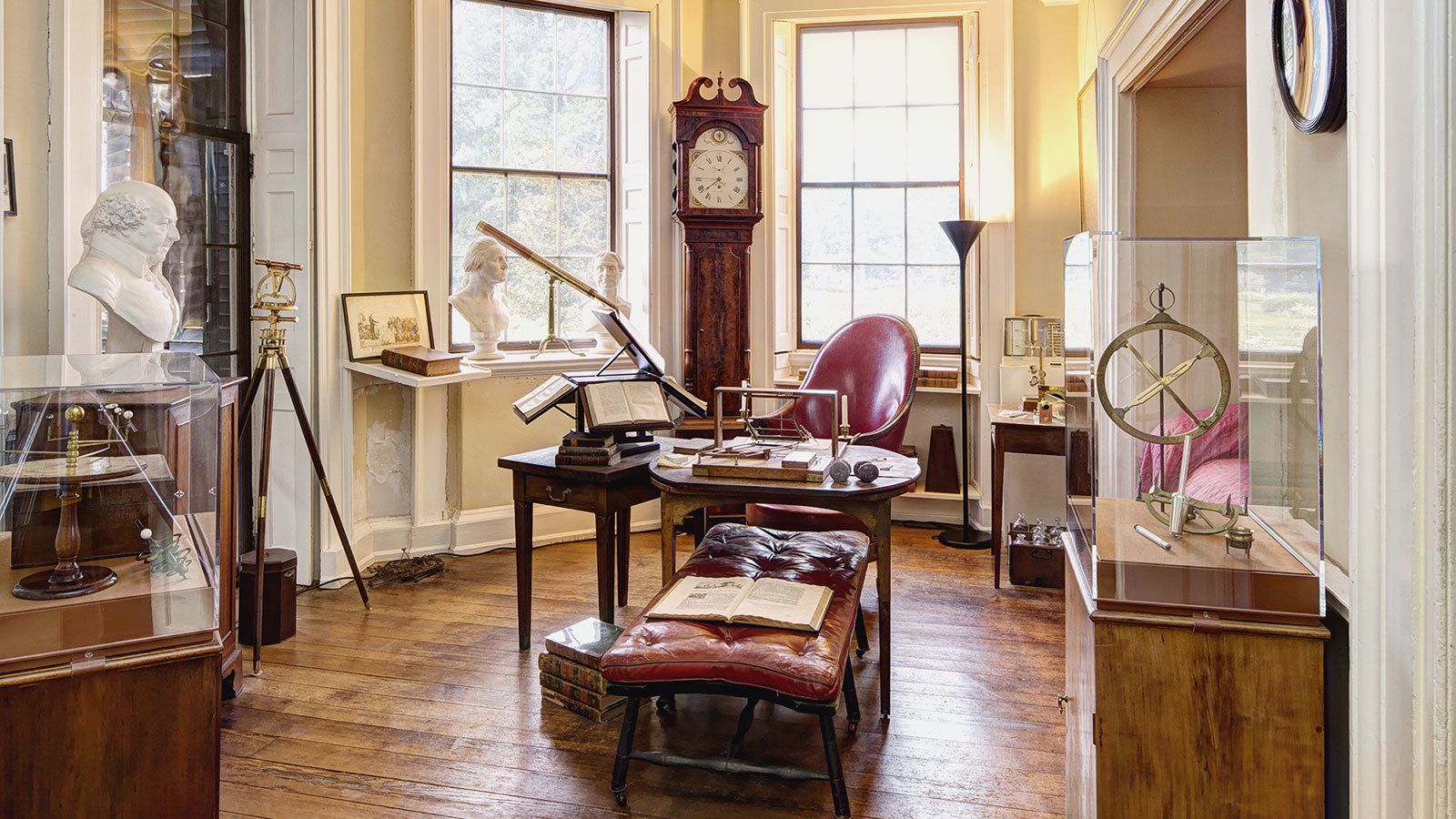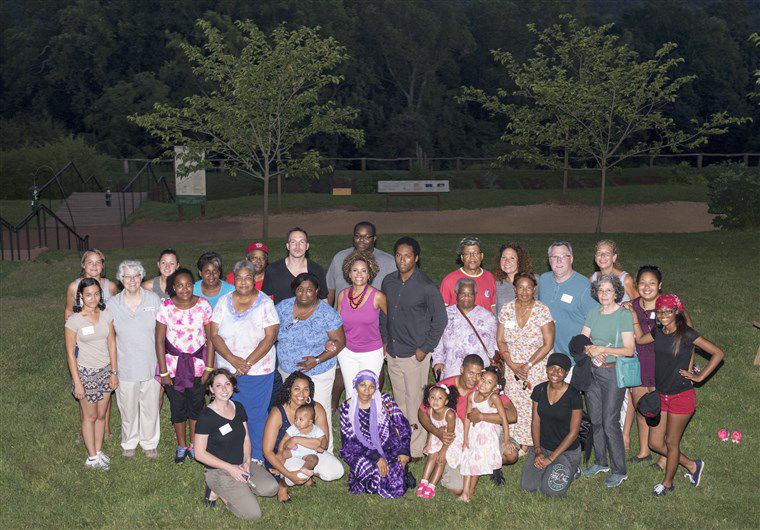CHAPTER TWO (II) - A Retelling
"My earliest recollections are of my grandmother Elizabeth Hemings at Monticello. I was about three years old. She was sick and upon her death bed. I was eating a piece of bread and asked if she would have some. She replied sweetly, "No child, granny don't want bread any more." She smiled, breathed her last and her head rolled to her chest. I have only a faint recollection of her. She was beautiful and kind."
"What of your father."
"He was a private man. I knew more of his domestic than his public life in his life time. It is only since his death that I have learned much of the latter, I have read his works and of his achievements in public office, including that of President. I was almost twenty one and a half years of age when my father died on the fourth of July, 1826."
"Was he strict with his children or involve himself in the plantation?"
"At home he was the quietest of men. He was hardly ever known to get angry, though sometimes he was irritated when matters went wrong, but even then he hardly ever allowed himself to be made unhappy any great length of time. Unlike Washington he had but little taste or care for agricultural pursuits. He left matters pertaining to his plantations mostly with his stewards and overseers. He always had Mechanics at work for him, such as carpenters, blacksmiths, shoemakers, coopers, etc."
"Was there anything he was passionate about?"
"Engineering. He seemed mostly to direct the Mechanics and operations with great interest. Almost every day of his later years he might have been seen among them. He occupied much of the time in his home office engaged in correspondence and reading and writing. His general temperament was smooth and even."
Jefferson's private cabinet provided a place for reading, contemplation, and experimentation.

"What about with his children?"
"He was undemonstrative. He was however, uniformly kind to all about him. He was not in the habit of showing partiality or fatherly affection to us children. We were the only children out of wedlock to my knowledge."
"What about his grandchildren?"
"He was affectionate toward his white grandchildren, of whom he had fourteen, twelve of whom lived to manhood and womanhood. His daughter Martha or Patsy married Thomas Mann Randolph by whom she had thirteen children. Two died in infancy. The names of the living were Ann, Thomas Jefferson, Ellen, Cornelia, Virginia, Mary, James, Benj. Franklin, Lewis Madison, Septemia and Geo. Wythe. Thos. Jefferson Randolph was Chairman of the Democratic National Convention in Baltimore last spring which nominated Horace Greeley for the Presidency, and Geo. Wythe Randolph was Jeff. Davis' first Secretary of War. Maria married John Epps, and raised one son, Francis."
"Was Thomas Jefferson in good health?"
"He generally enjoyed excellent health. I never knew him to have but one spell of sickness, and that was caused by a visit to the Warm Springs in 1818. Till within three weeks of his death he was hale and hearty, and at the age of eighty three years, walked erect and with a stately tread. I am now sixty eight, and I well remember that he was a much stronger man physically, even at that age, than I am."
"What about your profession?"
"When I was fourteen years old, I was put to the carpenter trade under the charge of John Hemings, Grandmother's youngest son. His father's name was Nelson, who was an Englishman. Grandmother had seven children by white men and seven by African men, fourteen in all."
"Did all your siblings take up professions?"
"My brothers, sister Harriet and myself, were permitted to stay about the "great house," and only required to do such light work as going on errands. Harriet learned to spin and to weave in a little factory on the home plantation. We were free from the dread of having to be slaves all our lives long, and were measurably happy. We were always permitted to be with our mother. It was her duty, all her life which I can remember, up to the time of father's death, to take care of his chamber and wardrobe, look after us children and do such light work as sewing, and Provision was made in the will of our father that we should be free when we arrived at the age of twenty one years. We had all passed that period when he died but Eston, and he was given the remainder of his time shortly after. He and I rented a house and took mother to live with us, till her death, which event occurred in 1835."
"May she rest in peace."
"You see, now that you have heard their story you don't think of my great grandmother and grandmother as ignorant heathens."
"I did not mean to cause offense."
"Of course not," he looks unconvinced. "My mother was alive when I married Mary McCoy in 1834. Mary's grandmother was a slave, and lived with her master, Stephen Hughes, near Charlottesville, as his wife. She was manumitted by him, which made their children free born. Mary McCoy's mother was his daughter. I was twenty eight and she twenty two years of age when we married."


"Did you always live here?"
"We lived and laboured together in Virginia till 1836, when we voluntarily left and came to Ohio. We settled in Pebble township, Pike County. We lived there four or five years and during my stay in the county I worked at my trade on and off for about four years. Joseph Sewell was my first employer. I built for him what is now known as Rizzleport No. 2 in Waverly. I afterwards worked for George Wolf Senior and I did the carpenter work for the brick building now owned by John J. Kellison in which the Pike County Republican is printed. I worked for and with Micajab Hinson. Now there was a man with a vision for modern buildings and recycling materials. He reminded me of the stories I heard about my great grandmother Susannah. I also reconstructed the building on the corner of Market and Water Streets from a store to a hotel for the late Judge Jacob Row."
"Were all your children born here in Ohio?"
"When we came from Virginia we brought one daughter, Sarah with us, leaving a son buried in the soil of Monticello."
Monticello, five thousand acre estate

We have born to us in this State nine children. Two are dead. The names of the living, besides Sarah, are Harriet, Mary Ann, Catharine, Jane, William Beverly, James Madison, Ellen Wales. Thomas Eston died in the Andersonville prison pen, and Julia died at home. William, James and Ellen are unmarried and live at home in Huntington town-ship, Ross County. All the others are married and raising families.
"Do you have any final words?"
"African American history is important. It is the all American story. It touches people of all races, it has pain and from it love and children. It is a story that defines what it is to be an American irrespective of race or gender. Despite the Declaration of Independence declaring that all men are created equal, racism, sexism, intolerance are with us, everywhere you look. My father was a founding father of these United States yet he was a flawed human being, like King David in the Bible who appears as the Prophet Dawud, peace be upon him in the Qu'ran. We have to confront the good and the bad in our families, in our communities if we are to free everyone from whatever shackles them. I look white, most of my recent ancestors are white, yet I was born a slave. Even now that I am free, I left my home State, my son has been incarcerated by laws that were written to reinslave people of African ancestry. My great grandmother, Susannah, my grandmother, Elizabeth and my mother Sally had a dream. A dream of equality and dignity for all African Americans, Mulattos, Native Americans even poor Europeans peasants that migrate here. My life as a Carpenter and Builder and local community organiser is the fulfilment of the dream they had before I was born. There is more work to do to help people in poverty whatever their race or gender the opportunity to not only be equal, but to live a life where their toil is rewarded with wages that give them and their families independence. I contribute to a dream that existed before I was born. To help the dream of my ancestors come to fruition and realise that it will be fully realised long after I have gone? Now there's a gift."

"I'd like to keep in touch, where can I reach you?"
"My post office address is Pee Pee, Pike County Ohio."
Descendants of Monticello's enslaved families in the Kitchen Yard, above Mulberry Row in 2016

Jacqueline Pettiford and her family, descendants of Madison Hemings, at Monticello

Bạn đang đọc truyện trên: Truyen247.Pro